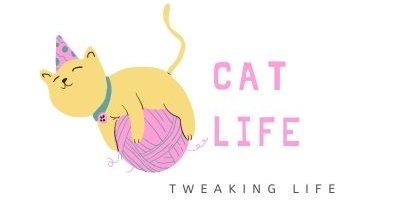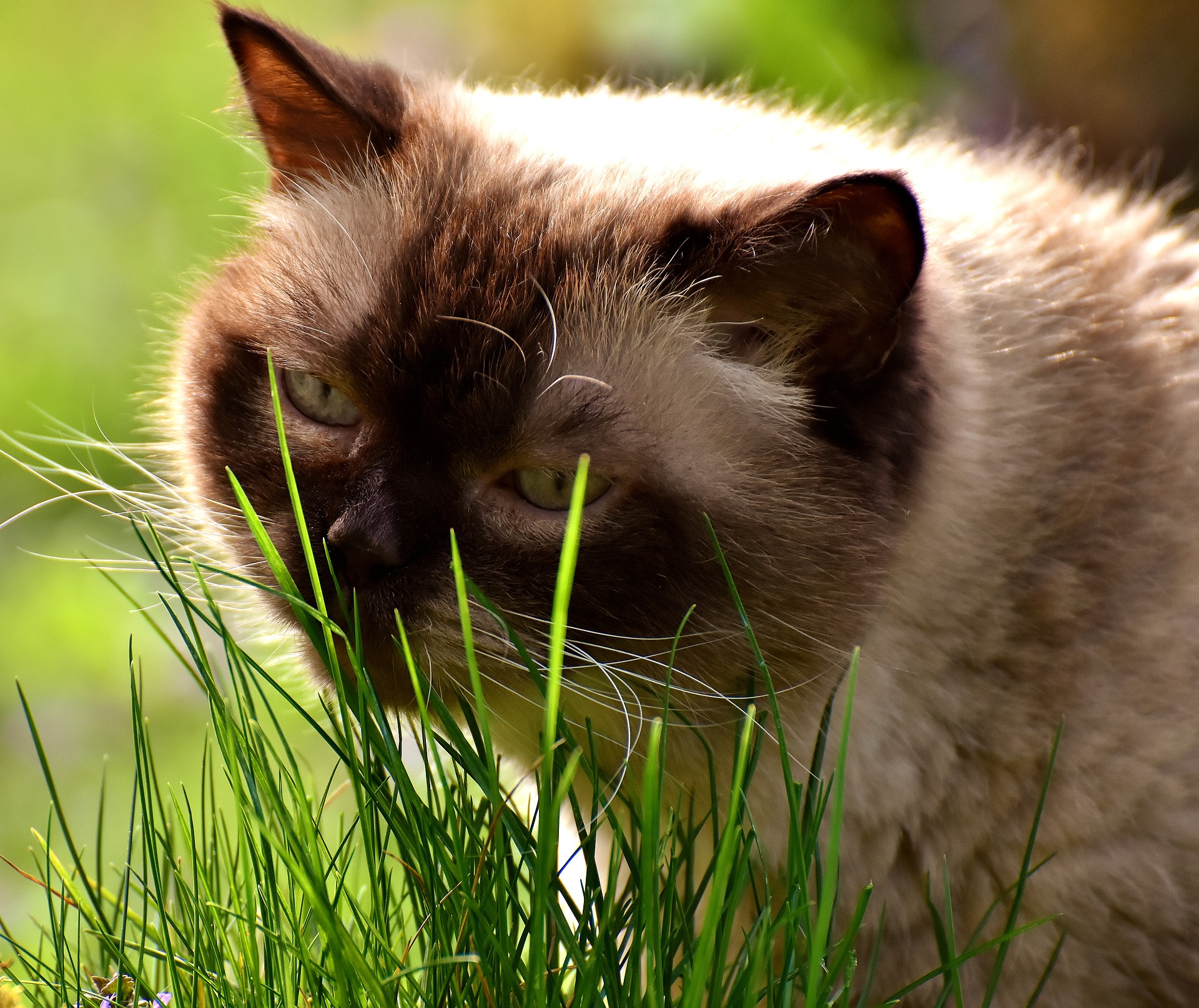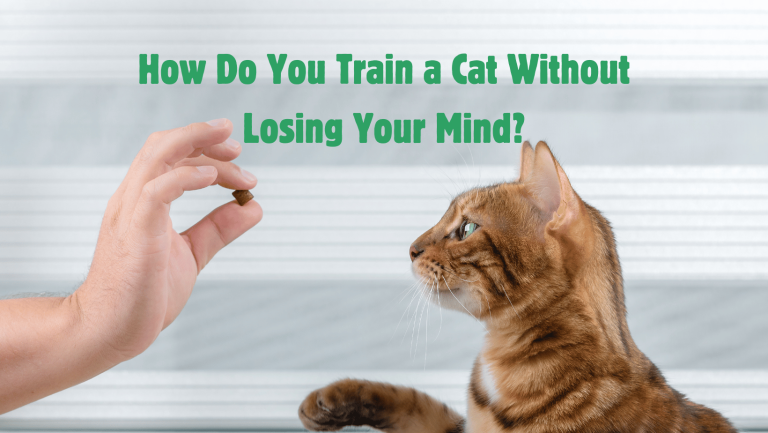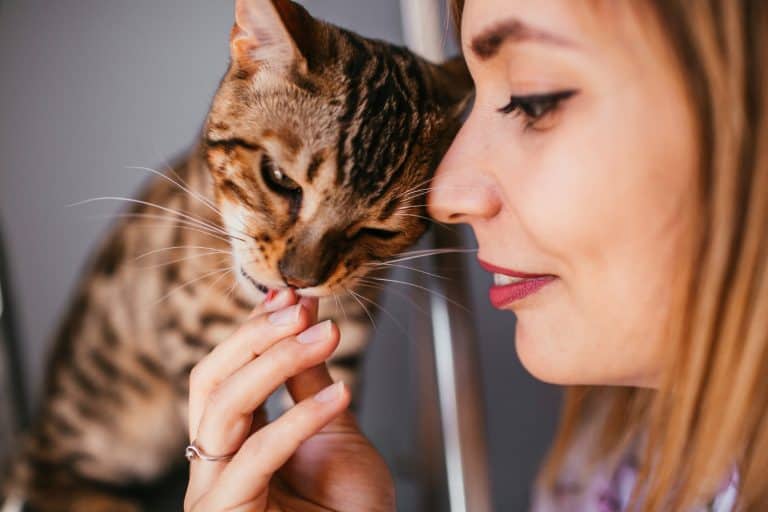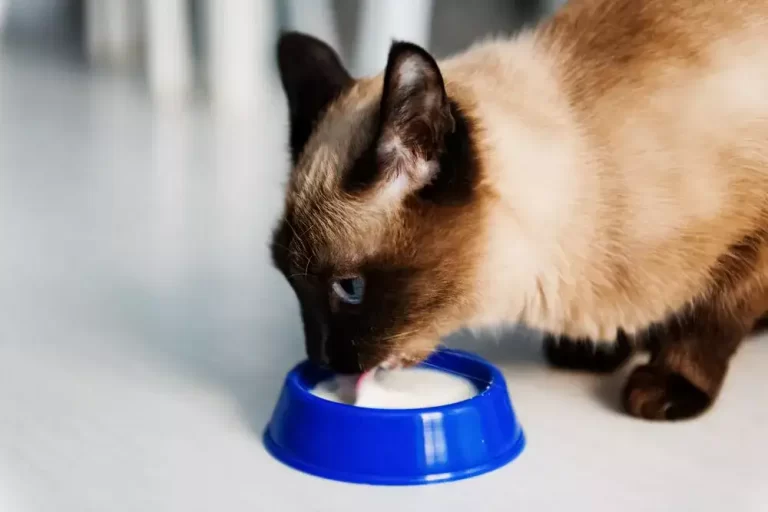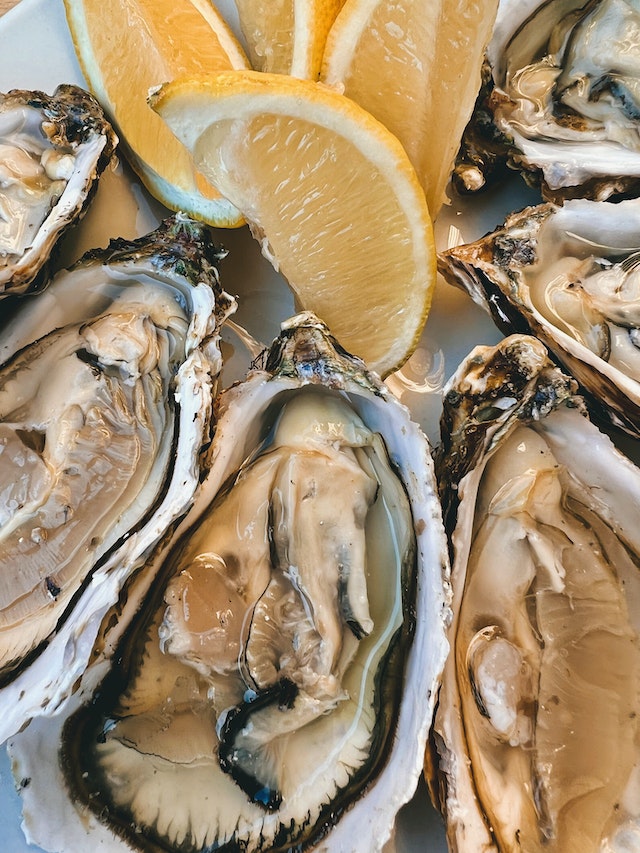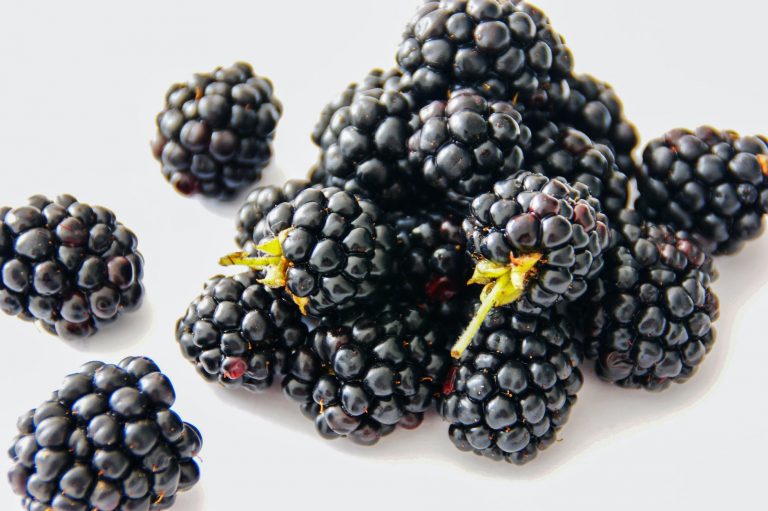Why does your cat eat grass? Understand your cat’s behavior
You’ve probably observed your cat eating some grass, and I bet it bothered you a lot. When I first watched my first cat as a kid, eating grass and throwing up some minutes later, I was spook! I couldn’t understand why a carnivore would eat grass willingly only to throw up moments later. Needless to say, my curiosity pushed me to research the matter, now that I have a new kitten and I want to be a better cat mum.
Cats, although carnivores, do eat grass. Most of them eat plants and grass to help out with their digestive tract. As a survival tactic, cats eat grass to expel anything that their system cannot digest. According to scientists, however, cats vomiting after eating grass is not their primary objective and is merely an occasional byproduct.
Cats eating grass is normal and shouldn’t worry you unless, of course, your feline is chewing lots of the blady grass. If that’s the case, you and your little feline friend should give the vet a much-needed visit.
Why do cats eat grass?
For centuries, cat lovers have tried to understand this strange behaviour on why cats would choose to eat grass despite being carnivorous. Here are some reasons why your feline is occasionally adding grass to their menu.
1. Grass helps out with a cat’s digestive system.
Unlike us, cats do not require a pate of salad alongside every meal they eat, but they still end up eating some grass. Their digestive tracts are not built for digesting grass, and this is precisely why they eat grass.
Since their bodies, can’t digest the grass, they will throw up and in the process, remove anything that their digestive tract can’t digest. Your feline may have eaten things that their body can’t digest, and kitty has to force them out.
Sometimes, your cat may have over-eaten and needs to spill out the excessive food. The fibre found in the grass comes in handy in expelling the undigestible materials and excess food.
Primarily, cats in the wild ate grass as a survival instinct. Sometimes, after a successful hunt, cats would end up eating feathers and bones. Since their bodies could not digest these, they ate grass to vomit it out!
The grass also comes in handy when dealing with parasites and worms. Although outdoor cats are more prone to getting parasites and worms, even one of the most sophisticated cats will use this tactic once they feel unwanted guests in their bodies.
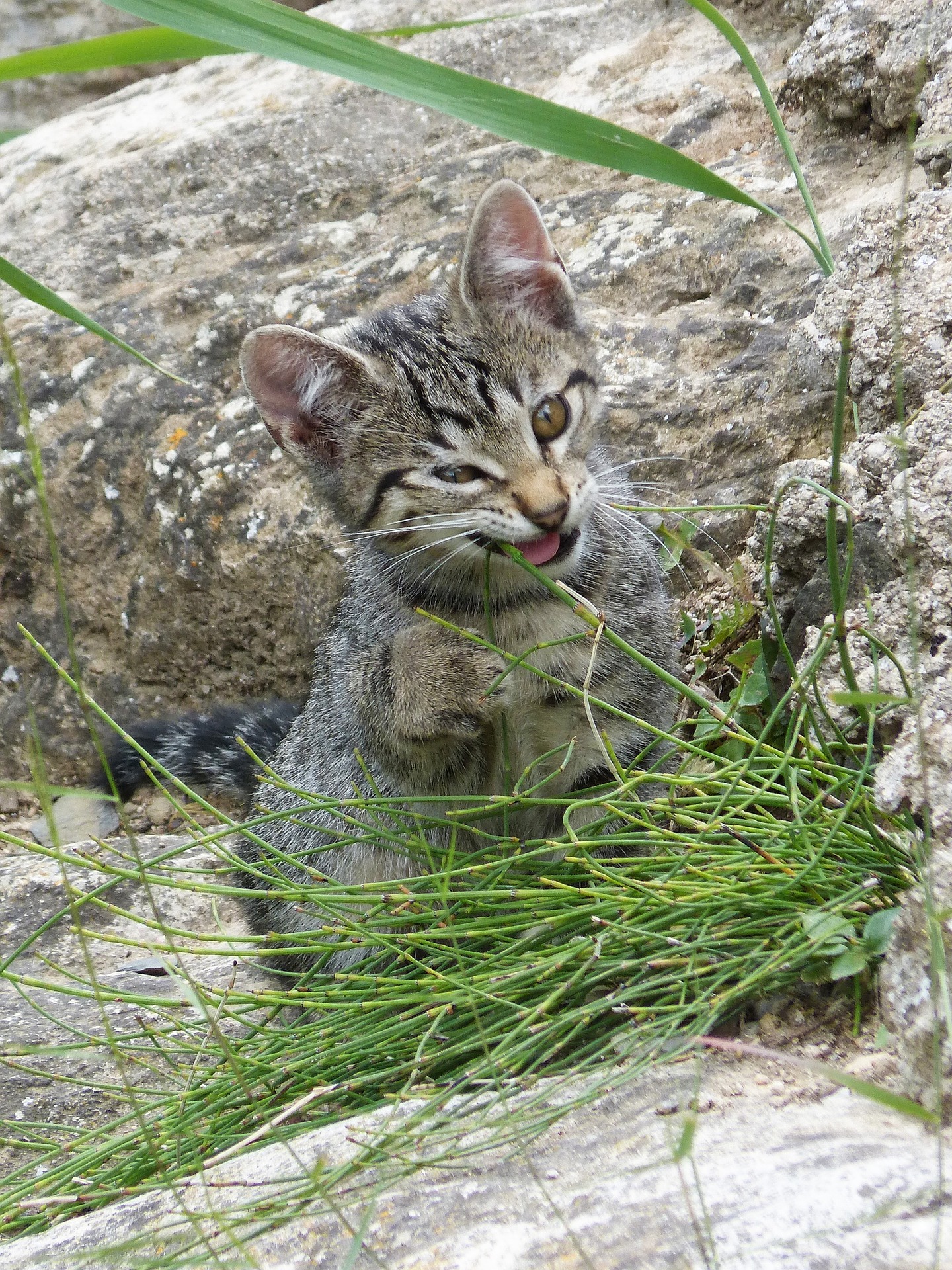
2. Grass helps to supplement a deficiency in vitamins.
Cats eat grass to gain Vitamin B9 (folic acid) which is also found in mother cat’s milk. If your kittie feels like she lacks this vital vitamin, she’ll chew up some blades to gain the folic acid from the grass juice.
Folic acid is essential to your kitten as it helps out with cell growth, digestion and haemoglobin production. If your cat lacks folic acid, she could end up with anaemia, a severe condition in cats.
If you suspect your cat may be eating grass to supplement the lack of folic acid, contact your vet to solve out the issue.
3. Grass helps to deal with anxiety.
Stress eating may seem like a human thing to do, but cats also enjoy it! Sometimes cats engage in stress/emotional eating by chewing up grass, and I mean lots of it!
While each cat is unique and will express their emotions differently, some cats show anxiety by eating grass. The meal is not to satisfy hunger but rather a means to soothe themselves.
If you notice this behaviour coupled with your cat avoiding other family members, isolating herself excessively etc., it is time to visit the vet and figure out ways to help deal with your cat’s stress.
Why does my cat diarrhoea after eating grass?
Grass helps clean out a cat’s digestive tract and intestines. This will either be through vomiting or diarrhoea.
Cats sometimes find that they ate undigestible items that have already gone too deep in the digestive tract. In a bid to prevent constipation, these cats will eat some grass to act as a natural laxative. The grass will help in breaking down these undigestible items the cat ate and make it a lot easier to pass the matter out.
Hairballs are some of the things a cat will try to get rid of through using grass. A hairball may get into a cat’s digestive tract through excessively licking and cleaning themselves. Since a cat can’t vomit a hairball, instinctively, she will eat some grass to help out with some action down there.
Is it safe if my cat eats grass?
Yes, it is safe and normal for your cat to eat some grass as long as it is in moderation. All cats do it, regardless of whether they are domesticated, pampered or the large wild cats like lions.
However, sometimes, the grass gets stuck in a cat’s nasal tract and cause her to exhibit excessive sneezing. If this happens, you need to rush your cat to the vet to have it manually removed.
If you notice your cat is excessively eating grass, you should make a trip to the vet to try and understand and rectify the behaviour.
Why does my cat eat grass every day?
If you observe your cat eating grass daily and/or vomiting some blood, then you should pay the vet a visit as this is a sign that your feline friend is unwell and may be having issues with her intestinal and digestive tract.
How often should my cat eat grass? Cats tend to eat grass occasionally; whenever the need arises. They are carnivores and will only engage themselves in a grass meal if they instinctively feel the dire need to eat grass. Most likely, your cat needs to expel something from their body or is lacking Vitamin B9. Sometimes, your cat may be trying to find an outlet to their emotions and does some hearty emotional eating by feasting on the grass. As long as your feline friend does not excessively feed on grass, there is nothing to worry about.
Does my indoor cat need to eat grass?
Indoor cats, just like any other cat, will occasionally need to chew on some grass. They are also more prone to having hairballs in their digestive tracts from cleaning themselves (they spend approximately 60% of their time licking themselves). The grass will come in handy as they try to expel the hairballs from their bodies.
It is crucial that your cat does not feed on any grass with chemicals as it is harmful to their health. To avoid these health complications, it is essential that you plant some grass for your feline. If you’re unsure of the toxic and non-toxic plants for your cat, check out this comprehensive list by the American Society for the Prevention of Cruelty to Animals.

It is important that you keep out some of the toxic house plants to maintain a healthy cat. If by any chance, your cat eats chemical or poisonous grass/plants, you need to rush to the vet to have them checked out.
Do cats eat grass when they have worms?
Cats will eat some grass to get rid of intestinal worms. By eating grass, the cat will do away with the worms alongside other indigestible materials in their digestive tract through their stool. The grass will act as a natural laxative, and everything will come out through the rare end.
Now that you understand why cats eat grass, would you like to understand some fascinating cat behaviour like why cats eat their kittens? You can also discover and understand the cat tail language to help you effectively communicate with your cat.
IF YOU FOUND THIS ARTICLE USEFUL AND YOU’D LIKE TO CHECK LATER, YOU CAN PIN IT ON YOUR PINTEREST CAT BOARD
